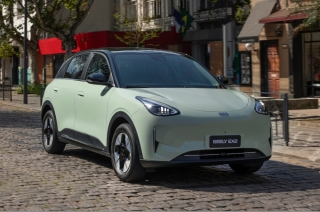
With the Nissan LEAF’s imminent arrival this year, the Japanese brand released an infographic as well as a few campaigns in the past as to the benefits of Electric Vehicles. One of the most apparent advantages that electric vehicles (EVs) have is its zero-emission operation.
Gasoline and diesel cars, no matter how efficient, still let out pollutants into the atmosphere. These gasses can contribute to respiratory problems and even can be a cause of death over a period of time. Nissan’s metrics state that air pollution is the 5th leading fatal health risk, and 9% of all deaths globally can be attributed to unclean air. Also according to Nissan, we need a 55% decrease in current emissions levels to stop global warming by 2030.
An EV produces no emissions because it is exclusively powered by electricity that comes from batteries. In a year, a normal gasoline car will produce up to 4.6 metric tons of greenhouse gasses. Measured in trees, 4.6 metric tons is the total carbon dioxide produced by 209 trees annually.
Since the model’s launch in 2010, the LEAF saved about 2,100,000 million metric tons of carbon dioxide. Globally, 13 billion kilometers were clocked in by LEAF drivers according to Nissan’s customer data.
An exciting proposition awaits those who wait, but an EV isn’t without its direct consumer benefit. With instantaneous torque and a good range that is achievable by this electric hatchback is one of its strong points. Fast charging solutions are also available and increase the speed at which the EV regains its expended power.
Latest News
-
Geely’s EX2 EV headed to Australia — is a Philippine launch possible? / News
The Geely EX2 is confirmed to go on sale in Australia in 2026. Could a launch in the Philippines also be on the cards?
-
Hyundai Motor Philippines is the FIFA Futsal Women's Teams' official mobility partner / News
Hyundai Motor Philippines strengthened its partnership with FIFA through its support of the FIFA Futsal Women's Teams.
-
Kia Philippines backs EJ Obiena as Atletang Ayala continues championing Filipino athletes / News
Kia Philippines strengthens its support for EJ Obiena, backing the Olympian with dedicated mobility at home and abroad.
Popular Articles
-
Electric Vehicles in the Philippines for under P1 million
Jerome Tresvalles · Aug 19, 2025
-
Top 3 Cars For Every Lifestyle—What Cars Are Right For You? | Behind a Desk
Caco Tirona · Apr 24, 2024
-
5 Tips to Maximize Fuel Efficiency
Jerome Tresvalles · Sep 09, 2024
-
Five driving habits that are draining your fuel tank
Jerome Tresvalles · Jun 24, 2025
-
Can engine braking harm your engine?
Jerome Tresvalles · Sep 11, 2025
-
Do electric cars even need maintenance?
Jerome Tresvalles · Oct 23, 2024
-
Best vehicles for an active outdoor lifestyle
Shaynah Miranda · Jul 25, 2024
-
How to drive different types of vehicle transmissions
May 23, 2024
-
5 easy ways to keep your car interior clean
Allysa Mae Zulueta · Nov 15, 2021
-
How to survive Metro Manila traffic
Earl Lee · Aug 16, 2022




